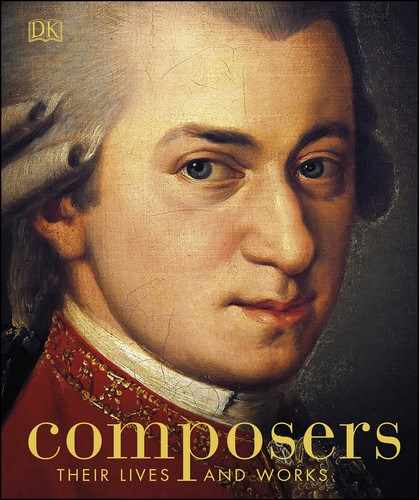Manuel de Falla
1876–1946, SPANISH
A leading figure in the nationalist revival of Spanish music in the early 20th century, Falla blended traditional folk melodies with modern harmony and orchestration to create vibrant works of universal appeal.

MANUEL DE FALLA, 1932
Falla was a devout Catholic, meticulous in his dress, reticent in manner, and fanatically fixed in his habits—qualities that are reflected in this portrait by Ignacio Zuloaga y Zabaleta.
IN CONTEXT
Flamenco and el cante jondo
Flamenco is a range of flamboyant singing styles and dances associated primarily with the gitanos, the wanderers of southern Spain. It exists both as folk music and as professional entertainment. Falla was especially attracted to el cante jondo (“the deep song”), which was often sung without guitar accompaniment, expressing dark themes of anguish and death. Falla mounted a festival in Granada in 1922, in association with the poet Federico García Lorca, to encourage amateur singers of el cante jondo and stimulate public interest in authentic flamenco, which was increasingly threatened by the rise of the modern urbanized world.

PORTRAIT OF PASTORA IMPERIO, JULIO ROMERO DE TORRES, 1922
Manuel María de los Dolores Falla y Matheu was born in Cádiz, Andalusia, in 1876, and studied at the Royal Conservatory of Music in Madrid. Under the influence of composer and musicologist Felipe Pedrell (1841–1922), he began exploring the diversity of Spain’s musical traditions, and in particular the folk songs and dances of Andalusia, which formed the basis for his first significant work, the one-act opera La vida breve (Life Is Short), completed in 1904.
Falla aimed to establish his place in the wider European contemporary music scene and in 1907 moved to Paris, where he associated with composers such as Claude Debussy and Maurice Ravel. His output through his seven years in France was slight (a handful of songs and short piano pieces) but his musical impetus was germinating. When World War I broke out in 1914 he returned to live with his parents in Madrid, and a period of rich creativity followed.
Music of passion
Despite his measured manner, Falla began to produce music that was flamboyant and passionate, as in El amor brujo (Love, the Magician), a ballet commissioned by the renowned flamenco dancer Pastora Imperio (see box). First performed in 1915, this piece included the dramatic Ritual Fire Dance, which became one of Falla’s most enduringly popular pieces.

EL AMOR BRUJO SCORE
The cover of the score for Falla’s work was illustrated by the Russian avant-garde artist and designer Natalia Goncharova, who captured the vibrant drama of flamenco.
International success
The sensuous Nights in the Gardens of Spain, described by the composer as “symphonic impressions for piano and orchestra,” followed in 1916, blending French influences with distinctively Andalusian rhythms and melodies. When his colorful two-act ballet The Three-Cornered Hat was premiered by Sergei Diaghilev’s prestigious Ballets Russes in London in 1919, Falla at last achieved international renown.
In the 1920s, Falla was a hero to a generation of Spanish Modernists such as the poet Federico García Lorca, who shared his fascination with the Andalusian wanderer heritage. But Falla’s music evolved in a different direction, following the contemporary trend toward Neoclassicism and the use of smaller orchestral ensembles. Works such as the Concerto for Harpsichord of 1926 harked back to a Spanish tradition of haughty pride and spiritual austerity of Catholic Castile.
Falla’s creative energy declined with age. He struggled for many years with a score for an oratorio, Atlántida, which he never completed. In the Spanish Civil War (1936–1939) he withdrew to Granada, saddened by the carnage and unable to commit to either side. After the victory of the Francoists in 1939 he left for Argentina, where he lived until his death in 1946.
